Beyond the dark, solid door of another unnamed facility, basking in the unbending Las Vegas heat, finely tuned athletes were somersaulting and dragging their bodies through the mill. A warehouse in Sin City is so much more than just a warehouse. The creaking of Olympic rings, carrying the weight of multiple, small acrobats, could be heard from the entrance. Where else could you be?
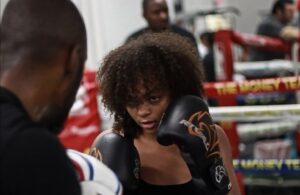
It’s thick, that wave of humidity, washing over tourists and residents going about their business. Before stepping inside and engaging her other senses, a young woman, fresh from her former life in the South Western state of Georgia, drew her deepest breath. Joining a new gym in the most aggressive of American cities didn’t phase her any more than her family’s decision to relocate. They loved moving from place to place, I’m told; it was a welcome distraction. A pummel horse is a pummel horse, after all – neon lighting and the Little White Chapel screaming in the distance couldn’t change that.
Six years ago, then 13-year old Czarina McCoy (3-0, 2KOs), was brave but cautious, with her sights firmly set on reaching the Olympic games. But on entry to the Cheyenne, Vegas-based gym, the sound she’d assumed had been the chains, stabilising those rings fixed on the wall, was correctly identified. It was a punchbag; swinging like a drunk in a bar fight, creased from clumping punches and coated in second-hand sweat.
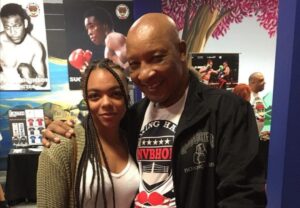 “I started boxing by accident, actually,” remarked the gymnast-turned-fighter. “We had just moved to Las Vegas, so I started doing gymnastics near where we lived at the time and their facility is literally right behind the boxing gym. But it’s like in these warehouses. So we kind of got turned around and we walked into the wrong gym. I go in there and I see people hitting stuff and I’m like, ‘Whoa. This is not gymnastics. What’s going on?'”
“I started boxing by accident, actually,” remarked the gymnast-turned-fighter. “We had just moved to Las Vegas, so I started doing gymnastics near where we lived at the time and their facility is literally right behind the boxing gym. But it’s like in these warehouses. So we kind of got turned around and we walked into the wrong gym. I go in there and I see people hitting stuff and I’m like, ‘Whoa. This is not gymnastics. What’s going on?'”
“Mr Richard Steele, Hall of Fame referee, he owns the gym that I started at. He came up to me and he was like, ‘Can you fight?’ You know, I couldn’t even hear myself think and he was just like, ‘Try it out. If you like it, stay.’ So I tried it. It was literally the hardest day of my life. But I liked it so much, all I wanted to do was train again. It wasn’t intimidating. But when I first went in there, I was just shocked because I was expecting people to be doing flips and balancing on beams and stuff, and I just see a whole bunch of people hitting things.”
Steele’s gym operates with the following mission statement, ‘the Foundation gives youth and families the strong foundation they need to thrive, a Steele Foundation.’ A man who’d earned his crust between the ropes – monitoring contests at the highest level – was perfectly placed to give back to Nevada and its adoring residents. Boxing had seasonally brightened their skyline, but Richard Steele knew that grassroots amateur clubs were just as important for Las Vegas’ boxing sustainability.
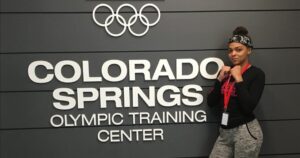 When super-flyweight Czarina McCoy wandered into the gym that fateful afternoon, she signed up for more than just an overhaul of her general fitness. Boxing was discipline and purpose. It was resilience, mentally as much as physically. Her family hadn’t had it easy – losing her mother when McCoy was only six-years old. But strength, unity and the solemn acceptance that life unexpectedly throws things at us, would allow both the single father and daughter to blossom as a team.
When super-flyweight Czarina McCoy wandered into the gym that fateful afternoon, she signed up for more than just an overhaul of her general fitness. Boxing was discipline and purpose. It was resilience, mentally as much as physically. Her family hadn’t had it easy – losing her mother when McCoy was only six-years old. But strength, unity and the solemn acceptance that life unexpectedly throws things at us, would allow both the single father and daughter to blossom as a team.Now, it is their time, and the Mayweather-trained fighter explained the importance of distinguishing her father’s position within their tight-knit team. Both McCoys have travelled cross-country, introducing themselves to parts of America and racking up amateur boxing victories. But when the gloves were hauled off and the vests were hung out to dry, it was crucial that Czarina’s father assumed his additional roles.
“It was rocky,” explained McCoy, “We couldn’t differentiate when we should be like fighter/coach or when we should be dad/daughter. And also, just when we should be friends. But after we got into the groove of things, into the rhythm, we learned how to do it. So the older I got, the better we could decipher when we should be what.”
“With me being a young adult now, my dad knows that in the gym or at the fights is when it’s time to be a coach. At home, it’s time to be a dad. When we’re out and hanging out, it’s time to be friends. I think it does make us closer but it definitely has [been tough].”
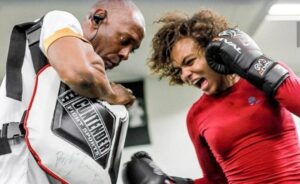 Despite their often-difficult and multi-faceted relationship, Czarina’s father was her only constant. During the seven years since her mother’s passing, he’s played both parts as best as possible. Admirably, he’s been her rock alongside McCoy’s grandmother who lived with the pair for a period, with both adults on-call to help cope with complex, teenage emotions.
Despite their often-difficult and multi-faceted relationship, Czarina’s father was her only constant. During the seven years since her mother’s passing, he’s played both parts as best as possible. Admirably, he’s been her rock alongside McCoy’s grandmother who lived with the pair for a period, with both adults on-call to help cope with complex, teenage emotions.
She’d been on record previously, interviewed at the Mayweather Gym, explaining that boxing was her priority. Czarina never had a boyfriend. She wasn’t interested. It was hard enough opening her thoughts to those posing as ‘friends’ – never entirely confident of their intentions. Such was boxing; a business sadly renowned for broken promises.

“When I was younger, I had millions of friends. But the older I get, the more serious my career gets and my circle has gotten very small. I probably have about three or four friends and two of them don’t even live in Vegas. I don’t really talk to anybody like that. And if I do talk to people, I’ll speak with my fans, but it’s not to the point where it’s like, ‘Oh, I’m trusting you with these things that you should know.’ You know, I keep my information very close to me, very personal, because it does get hard.
“Relationships are going to come into my life, friends are going to come into my life. I’m a young adult so that’s pretty much what all the people my age are doing right now. I have to have self-control and know that the people I have around are those that help me. I don’t think any of those things are bad, but if they’re not benefiting you then that’s when you have to cut them out of your life.
“It’s really hard to determine who’s going to be there for you because they really care about you, and who is going to be there for you because they know that you’re about to have all these things happen for you and they just want to hop on the bandwagon.”
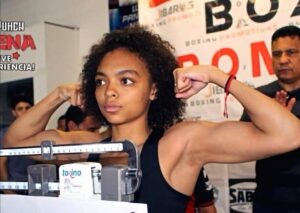
Czarina has left distractions in the dust and is currently settling into her first camp of the new year. She explained that training at Floyd Mayweather’s Vegas facility had inspired her, especially after receiving an award for leadership from the superstar when she was a young amateur. She later become the number-one ranked US youth at 112-pounds. Now, ‘Money’ pops in when he can, but it was Jeff Mayweather, of YouTube infamy, and Floyd Sr who’d played a part in taking Czarina from red-hot amateur champion to fledgling professional.
Still blessed with a low profile, McCoy could continue learning on the job, fighting on undercards or gracing smaller events. For professional fighters – often desperate to run before they can walk – this was their respite. With ticket sales, social media presence and boxing press to consider, it seemed that female fighters in particular, had to over-perform in order to retain the attention of an audience. Beating an opponent on points didn’t seem to be enough, but Czarina had already stopped two of three.
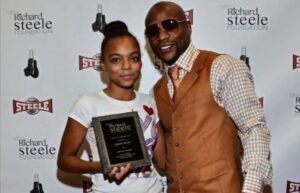 “I do feel pressure. I feel like every boxer does, to go in there and perform – amateur or pro. It’s a lot of pressure from the coaches, a lot of pressure from fans. You know, if you have potential, if you have talent and you have a lot of opportunity then that comes with a lot of pressure. So it’s like the good and the bad. You know, it’s really hard sometimes dealing with it all.”
“I do feel pressure. I feel like every boxer does, to go in there and perform – amateur or pro. It’s a lot of pressure from the coaches, a lot of pressure from fans. You know, if you have potential, if you have talent and you have a lot of opportunity then that comes with a lot of pressure. So it’s like the good and the bad. You know, it’s really hard sometimes dealing with it all.”
“I think the hardest thing that I have to go through in my career is staying true to myself. You know, my morals, my boundaries, who I am as a person. All of that can get kind of fuzzy to people when they get approached with fame or money or a group of people who want to be there for you – for their own benefit.
“I’m doing this for me, you know. Everybody else should be happy about it – for you. At the end of the day, I know that I’m doing it for me. So the pressure doesn’t get to me as much as it probably used to when I was younger and didn’t understand that I was doing it for myself and not for anybody else.”

Despite promoting the benefits of being single-minded, McCoy’s determination to succeed for her mother was evident. A teenage woman, making her way in a typically male-dominated sport, based in the gambling capital of the world, had definitely toughened up. Previously, she would spend time soaking up Georgia’s greenery, appreciating the trees and parks of the Southern state. Times had changed, as smog and disappointment lined the streets of Vegas.
Her maternal confidanté may be missing, but ‘The Black Rose’ continues to blossom. Approaching her twenties and her fourth fight, she reflected candidly on the loss of her mother. Too often in boxing, we’re guilty of telling the same stories; big brute, desperate to hurt his opponent; superstar, hungry to make their fortune; perennial challenger, too often hard-done-by. This wasn’t it.
McCoy is strikingly mature. She seems made for the bright lights and spoke openly throughout, discussing loneliness and hiding herself away from common distractions. Her earliest memories of her parents’ time together confirmed their common interest. It wasn’t backflips or beams; it was boxing.
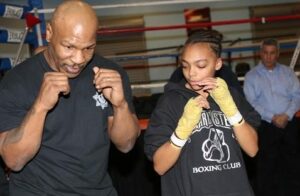
“She was a big fan,” Czarina remembered, fondly. “I remember when I was little they would always watch the fights in the living room. I was hearing them yelling at the fights. You know, whenever somebody was getting punched I would hear them yelling. I would hear them from my room. That’s like one of the earliest memories I have of seeing them watching a fight. She would get excited about the big fights. She loved ‘Sugar’ Shane Mosley.”
“I still get sad about it. It’s hard. Before, it would be harder for me to control the emotions I would feel about. I would always get mad whenever anyone would talk about it, because I would just feel like it was very disrespectful to bring up my mom when she’s gone. Now that I’m older, I wish that she was still here because I am becoming a woman and sometimes there’s just things that you can’t talk to your dad about. What would she do in this situation? And I… It just gets me down sometimes.
“I see other people with their moms and I’m like, ‘I never got to have those opportunities to do that; to grow up and share those times with my mom.’ I’m grateful to my dad, but I’ve always known that nothing is going to be better than having your mother help you. Just because I don’t have that, it honestly gives me motivation for the future when I get married and I have my kids. I want to be there if I can, as long as I can.”
Interview written by: Craig Scott
Follow Craig on Twitter at: @craigscott209